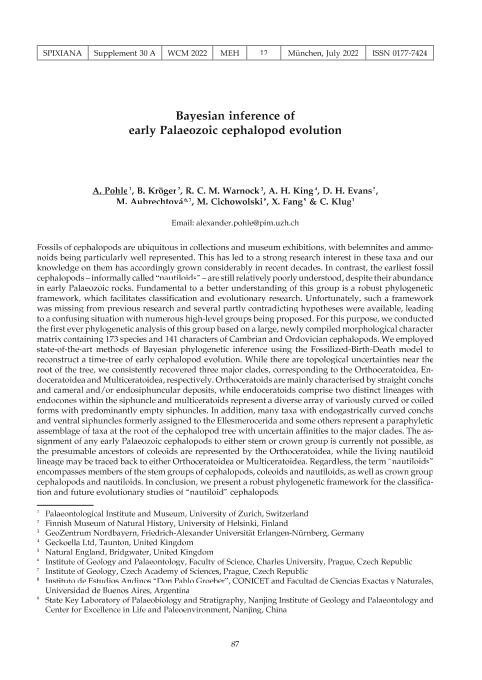Mostrar el registro sencillo del ítem
dc.contributor.author
Pohle, A.
dc.contributor.author
Kröger, B.
dc.contributor.author
Warnock, R. C. M.
dc.contributor.author
KING, Andy H.
dc.contributor.author
Evans, D. H.
dc.contributor.author
Aubrechtová, Martina
dc.contributor.author
Cichowolski, Marcela

dc.contributor.author
Fang, Xiang
dc.contributor.author
Klug, Christian
dc.date.available
2023-12-11T13:02:11Z
dc.date.issued
2022
dc.identifier.citation
Bayesian inference of early Palaeozoic cephalopod evolution; World Congress of Malacology 2022; Munchen; Alemania; 2022; 87-87
dc.identifier.issn
0177-7424
dc.identifier.uri
http://hdl.handle.net/11336/219768
dc.description.abstract
Fossils of cephalopods are ubiquitous in collections and museum exhibitions, with belemnites and ammonoids being particularly well represented. This has led to a strong research interest in these taxa and our knowledge on them has accordingly grown considerably in recent decades. In contrast, the earliest fossil cephalopods – informally called “nautiloids” – are still relatively poorly understood, despite their abundance in early Palaeozoic rocks. Fundamental to a better understanding of this group is a robust phylogenetic framework, which facilitates classification and evolutionary research. Unfortunately, such a framework was missing from previous research and several partly contradicting hypotheses were available, leading to a confusing situation with numerous high-level groups being proposed. For this purpose, we conducted the first ever phylogenetic analysis of this group based on a large, newly compiled morphological charactermatrix containing 173 species and 141 characters of Cambrian and Ordovician cephalopods. We employed state-of-the-art methods of Bayesian phylogenetic inference using the Fossilized-Birth-Death model to reconstruct a time-tree of early cephalopod evolution. While there are topological uncertainties near the root of the tree, we consistently recovered three major clades, corresponding to the Orthoceratoidea, Endoceratoidea and Multiceratoidea, respectively. Orthoceratoids are mainly characterised by straight conchs and cameral and/or endosiphuncular deposits, while endoceratoids comprise two distinct lineages with endocones within the siphuncle and multiceratoids represent a diverse array of variously curved or coiled forms with predominantly empty siphuncles. In addition, many taxa with endogastrically curved conchs and ventral siphuncles formerly assigned to the Ellesmerocerida and some others represent a paraphyleticassemblage of taxa at the root of the cephalopod tree with uncertain affinities to the major clades. The assignment of any early Palaeozoic cephalopods to either stem or crown group is currently not possible, as the presumable ancestors of coleoids are represented by the Orthoceratoidea, while the living nautiloid lineage may be traced back to either Orthoceratoidea or Multiceratoidea. Regardless, the term “nautiloids” encompasses members of the stem groups of cephalopods, coleoids and nautiloids, as well as crown group cephalopods and nautiloids. In conclusion, we present a robust phylogenetic framework for the classification and future evolutionary studies of “nautiloid” cephalopods.
dc.format
application/pdf
dc.language.iso
eng
dc.publisher
Zoologischen Staatssammlung München
dc.rights
info:eu-repo/semantics/openAccess
dc.rights.uri
https://creativecommons.org/licenses/by-nc-sa/2.5/ar/
dc.subject
EARLY CEPHALOPODS
dc.subject
EVOLUTION
dc.subject
BAYESIAN INFERENCE
dc.subject
PHYLOGENY
dc.subject.classification
Paleontología

dc.subject.classification
Ciencias de la Tierra y relacionadas con el Medio Ambiente

dc.subject.classification
CIENCIAS NATURALES Y EXACTAS

dc.title
Bayesian inference of early Palaeozoic cephalopod evolution
dc.type
info:eu-repo/semantics/publishedVersion
dc.type
info:eu-repo/semantics/conferenceObject
dc.type
info:ar-repo/semantics/documento de conferencia
dc.date.updated
2023-11-16T13:37:54Z
dc.journal.pagination
87-87
dc.journal.pais
Alemania

dc.journal.ciudad
Munchen
dc.description.fil
Fil: Pohle, A.. Universitat Zurich. Instituto Palaontologisches Institut And Museum; Suiza
dc.description.fil
Fil: Kröger, B.. University of Helsinki; Finlandia
dc.description.fil
Fil: Warnock, R. C. M.. Universitat Erlangen-nurnberg. Faculty Of Sciences. Department Of Biology.; Alemania
dc.description.fil
Fil: KING, Andy H.. No especifíca;
dc.description.fil
Fil: Evans, D. H.. No especifíca;
dc.description.fil
Fil: Aubrechtová, Martina. Charles University; República Checa
dc.description.fil
Fil: Cichowolski, Marcela. Consejo Nacional de Investigaciones Científicas y Técnicas. Oficina de Coordinación Administrativa Ciudad Universitaria. Instituto de Estudios Andinos "Don Pablo Groeber". Universidad de Buenos Aires. Facultad de Ciencias Exactas y Naturales. Instituto de Estudios Andinos "Don Pablo Groeber"; Argentina
dc.description.fil
Fil: Fang, Xiang. No especifíca;
dc.description.fil
Fil: Klug, Christian. Universitat Zurich. Instituto Palaontologisches Institut And Museum; Suiza
dc.relation.alternativeid
info:eu-repo/semantics/altIdentifier/url/https://zsm.snsb.de/ueber-uns/spixiana-supplemente/
dc.relation.alternativeid
info:eu-repo/semantics/altIdentifier/url/https://pfeil-verlag.de/wp-content/uploads/2023/07/spx_suppl-30as.pdf
dc.relation.alternativeid
info:eu-repo/semantics/altIdentifier/doi/http://dx.doi.org/10.23788/SPX-Suppl30A
dc.conicet.rol
Autor

dc.conicet.rol
Autor

dc.conicet.rol
Autor

dc.conicet.rol
Autor

dc.conicet.rol
Autor

dc.conicet.rol
Autor

dc.conicet.rol
Autor

dc.conicet.rol
Autor

dc.conicet.rol
Autor

dc.coverage
Internacional
dc.type.subtype
Congreso
dc.description.nombreEvento
World Congress of Malacology 2022
dc.date.evento
2022-07-31
dc.description.ciudadEvento
Munchen
dc.description.paisEvento
Alemania

dc.type.publicacion
Journal
dc.description.institucionOrganizadora
Universidad de Múnich
dc.source.libro
Spixiana Supplement 30 A
dc.source.revista
Spixiana

dc.date.eventoHasta
2022-08-05
dc.type
Congreso
Archivos asociados
